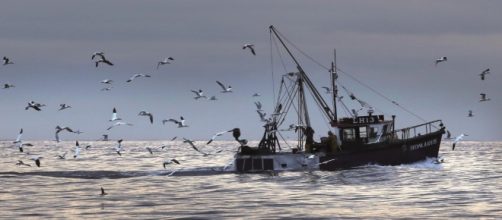The government are producing details of the Great Repeal Bill, which is the bill to choose what EU legislation and regulations to fully incorporate into British law. However, with issues such as energy, environment and climate change, there is concern over what vital regulations that are long-term ideals and plans will be kept and developed. This is the second part looking at the Common Agriculture Policy (CAP) and Common Fisheries Policy (CFP).
Both, CAP, and CFP, were cited throughout the original referendum debate as policies that inhibit our industries, even resulting in the weirdest moment of the debate when a flotilla ‘battle’ started on the Thames involving Nigel Farage and Bob Geldof.
Common Agriculture Policy (CAP)
The Common Agricultural Policy (CAP) is cited by Europhiles as an inhibitor on British farms, forgetting the importance of this policy. It has been a force in maintaining production across Europe and there is a high chance that the government will keep it. This policy has helped maintain the low-input high-nature value farms, whilst creating pressures on the environment from advanced production and input.
Since 1990 CAP has gone through a series of reforms to try and improve its environmental orientation, sharply reduce subsidies and their harmful impacts. Despite the reforms there is a way to go before they create a truly ‘green’ policy.
There is uncertainty whether a Brexit would do serious harm or not.
The UK will have to create a new set of national agriculture policies, where there would be major variations between England, Scotland, Northern Ireland, and Wales. It is unfortunate that current UK policy, strongly supported by the Treasury, is to cut the expenditure of agriculture.
There are question marks over whether future governments would also apply the same agriculture policy, and experts expect major cuts. This could see the incentives for greener farming decline. This also would raise question marks over an imposed environmental obligation, due to more subsidised competition from EU states. There is a great deal of uncertainty with the CAP and it is perceived that a Brexit would pose more of a risk to the environment than not.
Common Fisheries Policy (CFP)
Critics cite CFP significantly more than other EU policy, and this was the reason for the ‘naval battle’ on the Thames during the referendum. This policy has had its issues since it was introduced, and has been mostly unsatisfactory in environmental terms. However, other transnational fisheries management regimes have suffered similar weaknesses, it is difficult to manage marine life as there are no clear boundaries. Recently the CFP was reformed and is now heading in the right direction to tackle the environmental burden of industrial scale fishing.
Regardless of what deal the UK strikes with the EU, one thing is for certain is that CFP will cease to apply. The difficulties this will impose are that we would have to negotiate fishing agreements with EU member states.
There are also the politically sensitive discussions between devolved British jurisdictions, as most stocks migrate to and from British waters. British fishers also work in other states’ waters.
There is no evidence to suggest that there would be closer alignment to ‘total allowable catch’ in the UK, and no evidence that this will allow for further ‘greening’ amongst fisheries. Overall there is a significant risk to marine life if we were to leave the EU. CFP allows the protection of stocks, and helps sustainability.
Any agreement that is made with the UK and the EU, we would have to use the framework of CFP as this has far too many benefits to stock sustainability. There would be too many unwanted risks and international marine law does not provide the means to ensure compliance, this is a significant weakness.

